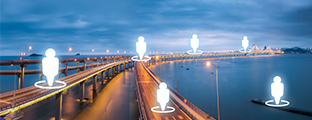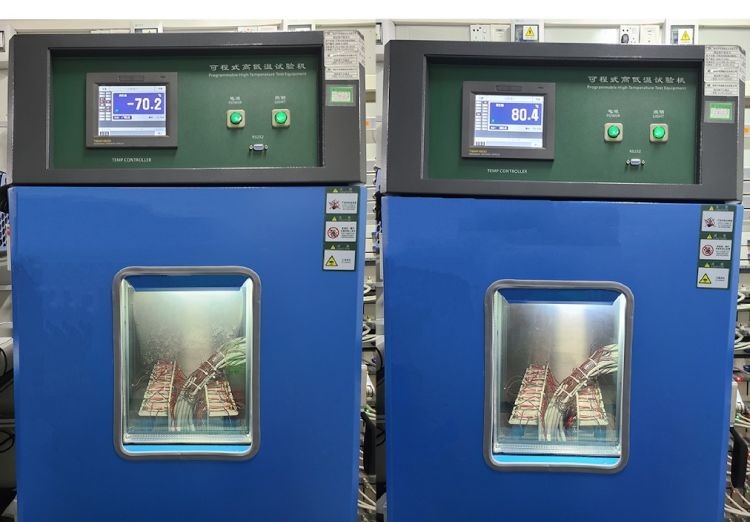

Hotline:0755-22277778
Tel:0755-22277778
Mobile:13826586185(Mr.Duan)
Fax:0755-22277776
E-mail:duanlian@xianjinyuan.cn
This is China's first battery cell product with a wide temperature range, low cost, and long lifespan, which is expected to break the pattern of the battery industry. Professor Arumugam Manthiram, a renowned expert in international energy storage materials and electrochemistry at the University of Texas at Austin, pointed out in his review paper that "this achievement first proposes the concept of a dual functional aluminum based negative electrode, which is matched with commercial positive electrodes such as lithium cobalt oxide, lithium iron phosphate, ternary materials, etc. The battery exhibits excellent long cycle stability, making aluminum based batteries have great potential for application

Partial (left) and batch testing (right) of the large-scale production line for new batteries.
Adapt to environmental temperature differences across 150 ℃
From cars to electronic products, lithium-ion batteries have already penetrated into people's lives, providing "power" for clothing, food, housing, and transportation. The "2021 China Lithium Battery Industry Development Index White Paper" recently released by the CCID Research Institute of the Ministry of Industry and Information Technology shows that China has become the world's largest lithium battery consumer market for five consecutive years.
However, due to the limitations of key materials in batteries, a major limitation of lithium-ion batteries is that they cannot be charged at low temperatures below zero, and safety cannot be guaranteed at high temperatures above 50 ℃. China has a vast territory, and the temperature varies greatly with the region and season. In the northern region, the winter temperature can be as low as -40 ℃ or below, while in the southern region, the summer surface temperature can reach over 50 ℃. In winter, electric vehicles cannot be started, smartphones automatically shut down, and electric vehicles frequently catch fire in summer.
For this reason, the research team led by Tang Yongbing has spent nearly 10 years developing a new type of lithium-ion battery technology that is both frost resistant and heat-resistant. The minimum operating temperature can reach -70 ℃, while the maximum operating temperature can reach up to 80 ℃, and both low and high temperature performance can be achieved simultaneously.
It is reported that the high and low temperature performance, cycle life, safety performance and other indicators of this product have been tested by third-party authoritative institutions and have obtained standards and qualification certifications such as ISO9001, GB31241-2014, IEC 62133-2:2017, UN38.3, etc.

New battery high and low temperature performance testing (left: -70 ℃ test, right: 80 ℃ test).
Developing key negative electrode materials
Where is the new type of battery? It is reported that the team mainly focuses on the negative electrode material and electrolyte.
It is understood that the current technology related to positive electrode materials in batteries is approaching the "ceiling", and there is still room for development in negative electrode materials to improve performance. To this end, the team has developed a new type of aluminum based composite negative electrode material. By matching it with commercial lithium-ion battery positive electrode materials, they have successfully developed new products such as lithium manganese oxide, lithium iron phosphate, and ternary batteries for different application scenarios.
The battery products we have developed not only have the characteristics of heat and frost resistance, but also have the advantages of high safety, long endurance, fast charging, and low cost, "the team said.
In terms of safety performance, conventional lithium batteries will produce lithium dendrites inside as they are continuously used, which not only affects the charging capacity but may also puncture the separator, causing hidden dangers such as battery short circuits. The new aluminum based negative electrode developed by the team can effectively alleviate the formation of lithium dendrites under low temperature and overcharge conditions, improving safety.
In terms of battery life, thanks to the high theoretical capacity of aluminum based negative electrode materials, the energy density of this battery is 13% to 25% higher than traditional lithium-ion batteries, which can achieve long battery life. In addition, due to the excellent conductivity of the aluminum based composite negative electrode, the product also exhibits impressive fast charging performance, which can be fully charged in 20 minutes, providing a solution for half-hour charging needs.
In terms of cost, based on the performance advantages of aluminum based composite negative electrodes and the development of high-performance electrolytes, low-temperature battery products can eliminate dependence on expensive nanoscale positive electrode materials and reduce battery costs by 10% -30%.
Application scenario "from heaven to earth"
It is reported that this mass production was carried out at the request of a certain electric vehicle customer, providing a batch of battery cells for in-depth performance evaluation, and the relevant performance evaluation has met the usage requirements.
Some scenarios require normal charging and discharging at -40 ℃, while others have higher requirements for long cycles. Based on core technologies and practical situations, we continuously adjust our products. The team stated that the relevant products can be applied to photovoltaic energy storage, household energy storage, communication base station energy storage, rail transportation, national defense construction, aerospace, polar scientific research and other fields, especially in high-altitude and subtropical regions, significantly expanding the application scope of batteries.

Advanced Institute (Shenzhen) Technology Co., Ltd, © two thousand and twenty-onewww.avanzado.cn. All rights reservedGuangdong ICP No. 2021051947-1 © two thousand and twenty-onewww.xianjinyuan.cn. All rights reservedGuangdong ICP No. 2021051947-2